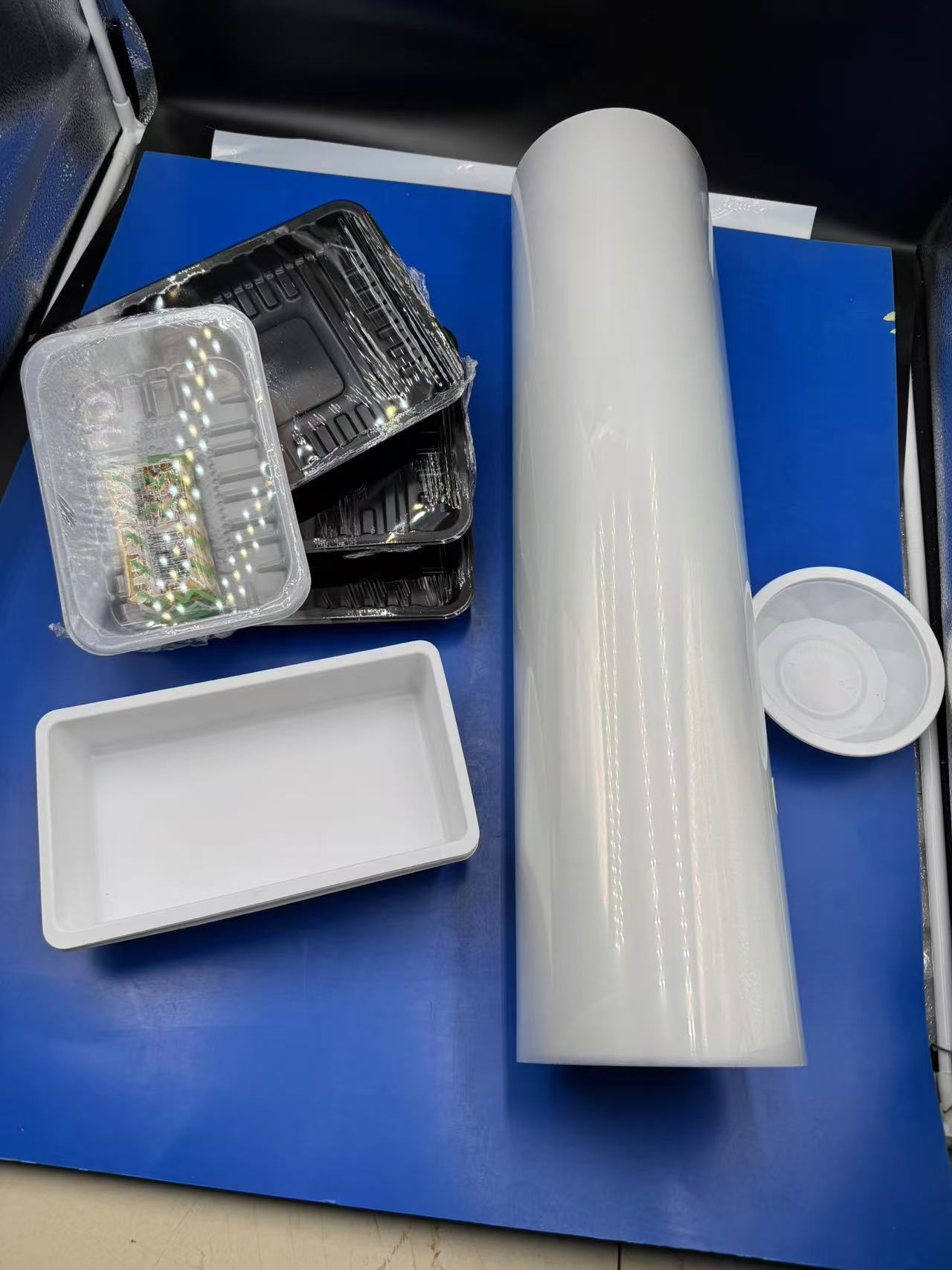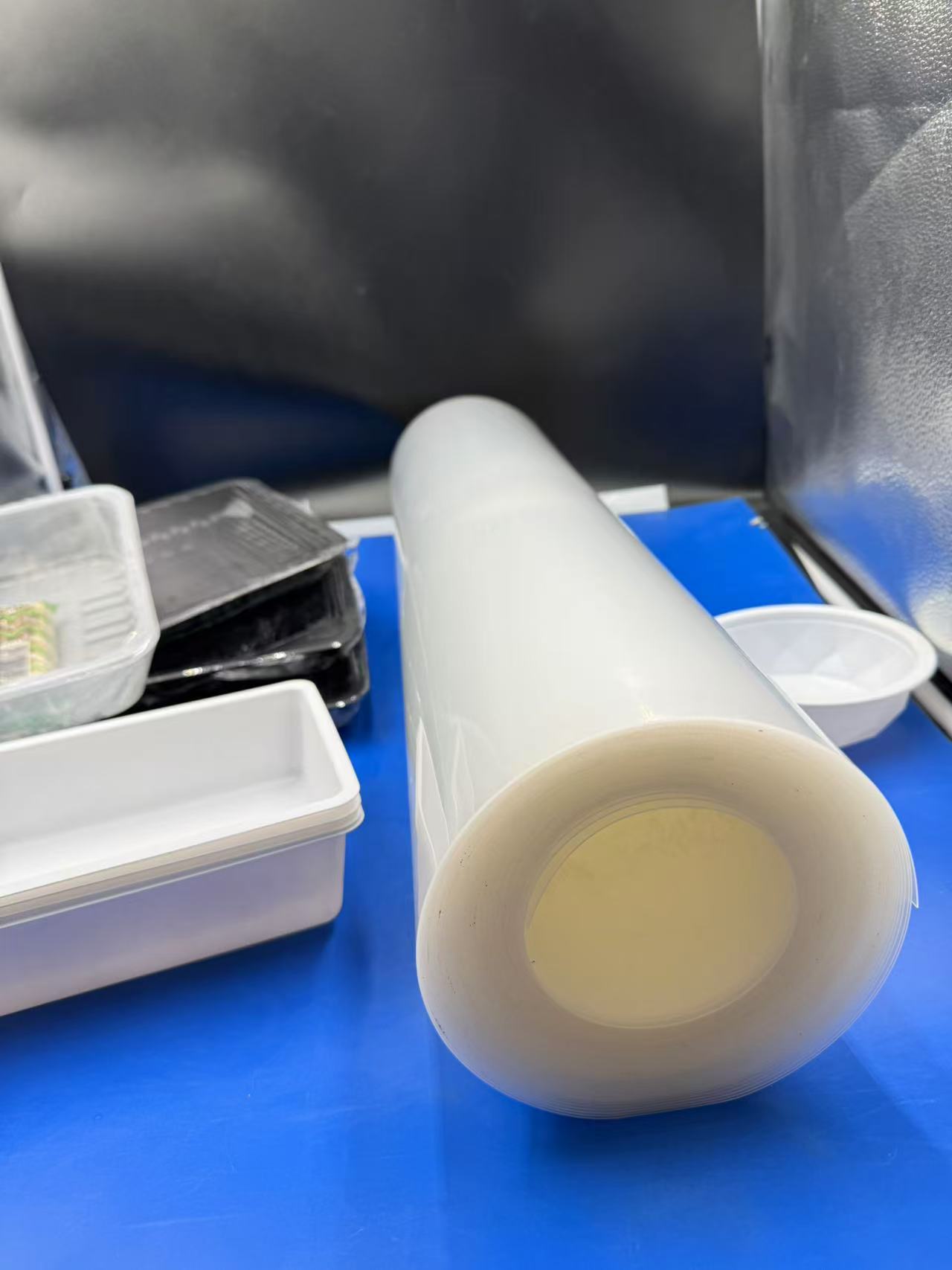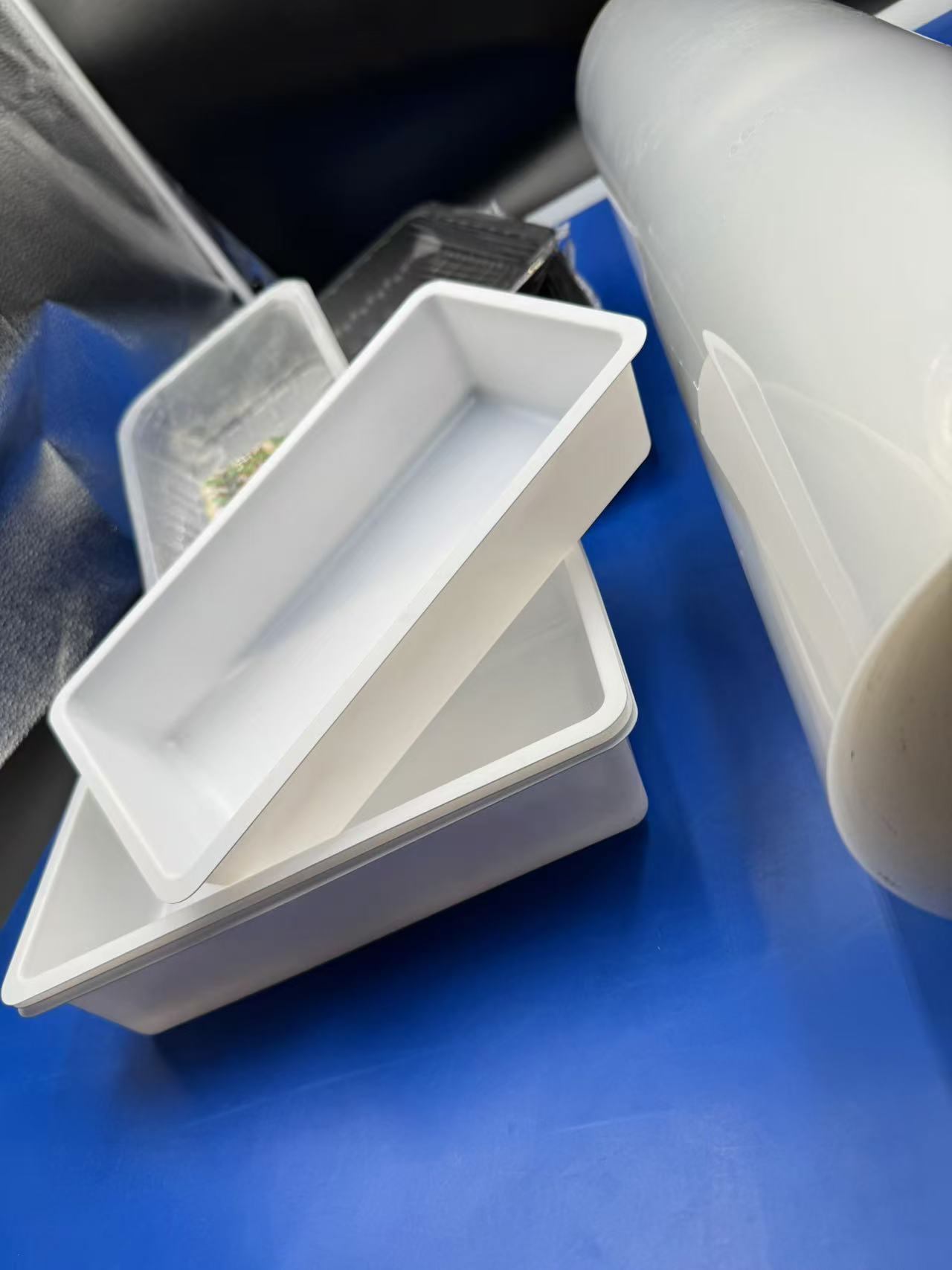Polypropylene (PP) is a thermoplastic polymer that has become a cornerstone in the world of packaging due to its remarkable versatility,
durability, and cost-effectiveness. Among its various forms, semi-transparent PP film stands out as a material that balances functionality with aesthetic appeal, making it an ideal choice for disposable tableware thermoforming packaging. This article delves into the unique properties of semi-transparent PP film and explores its practical applications in creating disposable tableware such as cups, trays, and lids. With a focus on its physical and chemical characteristics, we will uncover why this material is increasingly favored in the food service industry, supported by vivid examples and logical reasoning!
Properties of Semi-Transparent PP Film
Semi-transparent PP film is derived from polypropylene resin through processes such as extrusion and calendering, often enhanced with additives to achieve specific performance traits. Its semi-transparent nature—offering a balance between clarity and opacity—sets it apart from fully transparent or opaque alternatives. Below are the key properties that define this material and contribute to its widespread use:
- Low Density and Lightweight Design
PP film boasts one of the lowest densities among plastics, typically around 0.90 g/cm³. This lightweight characteristic reduces material usage and transportation costs, making it an economical choice for mass-produced disposable tableware. For instance, a stack of 100 thermoformed PP cups weighs significantly less than equivalent items made from polystyrene (PS) or polyethylene terephthalate (PET), easing the burden on logistics and storage.
- Heat Resistance
One of the standout features of PP film is its ability to withstand high temperatures, with a melting point typically ranging from 130°C to 171°C, depending on its formulation. This heat resistance is crucial for disposable tableware intended for hot food or beverages, such as soup containers or coffee cups. Unlike PET, which softens at lower temperatures, semi-transparent PP film maintains structural integrity when exposed to steaming broths or microwave reheating, ensuring safety and convenience for consumers.
- Chemical and Biological Resistance
PP film exhibits excellent resistance to a wide range of chemicals, including acids, bases, and organic solvents. This property ensures that it does not react with acidic foods like tomato sauce or oily dishes, preserving both the integrity of the packaging and the quality of the food. Additionally, its resistance to mold, mildew, and bacteria makes it a hygienic option for single-use tableware, a critical factor in food safety standards.
- Mechanical Strength and Flexibility
Despite its lightweight nature, semi-transparent PP film offers a robust balance of stiffness and flexibility. Its semi-crystalline structure provides sufficient tensile strength to resist cracking or tearing during the thermoforming process, while its flexibility allows it to conform to intricate mold shapes. For example, a thermoformed PP tray can hold a heavy serving of pasta without deforming, yet it remains pliable enough to be easily stacked or disposed of after use.
- Semi-Transparency and Aesthetic Appeal
The semi-transparent quality of PP film strikes a unique chord in packaging design. It allows consumers to glimpse the contents—enhancing visual appeal—while maintaining a degree of opacity that masks minor imperfections or residues. This makes it particularly suitable for disposable tableware like milk tea cups or dessert containers, where a hint of the product inside can entice customers without revealing every detail.
- Cost-Effectiveness and Processability
PP film is relatively inexpensive to produce, thanks to the abundance of propylene monomers and efficient manufacturing techniques like multi-layer co-extrusion. Its low melt viscosity facilitates easy processing during thermoforming, reducing energy consumption and equipment wear. This cost-effectiveness translates into affordable end products, a key consideration for businesses in the competitive fast-food and takeaway market.
Applications in Disposable Tableware Thermoforming Packaging
Thermoforming is a manufacturing process where a plastic sheet, such as semi-transparent PP film, is heated to a pliable state, molded into a specific shape, and cooled to create a finished product. In the realm of disposable tableware, this technique leverages the properties of PP film to produce a variety of items tailored to modern dining needs. Here’s how semi-transparent PP film excels in this application:
- Disposable Cups for Beverages
Semi-transparent PP film is widely used to create disposable cups for cold and hot drinks alike. Imagine a bustling milk tea shop on a summer afternoon: customers line up for refreshing iced teas served in semi-transparent PP cups. The film’s clarity allows the vibrant layers of tea, milk, and tapioca pearls to peek through, enhancing the drink’s allure. For hot beverages like coffee or herbal tea, the heat resistance of PP film ensures the cup retains its shape, offering a reliable and safe drinking experience. Unlike PS cups, which may crack under heat, PP cups provide durability without sacrificing affordability.
- Food Trays and Containers
In fast-food restaurants and meal delivery services, semi-transparent PP film is thermoformed into trays and containers for dishes ranging from salads to hot entrees. Consider a takeaway lunch box containing steaming rice and curry: the PP tray withstands the heat and moisture without warping, while its semi-transparent lid offers a subtle view of the colorful meal inside. This combination of practicality and presentation elevates the customer experience, making PP film a preferred choice over PET, which struggles with high-temperature applications.
- Lids for Bowls and Cups
Thermoformed lids made from semi-transparent PP film are essential for sealing bowls and cups, ensuring spill-proof transport and storage. Picture a bakery delivering cupcakes in PP containers with matching lids: the semi-transparency allows a peek at the frosting swirls, tempting customers while keeping the treats secure. The film’s flexibility ensures a snug fit over the container’s rim, and its chemical resistance prevents degradation from sugary or oily residues, outperforming PS lids in durability.
- Microwaveable Tableware
With the rise of convenience foods, microwaveable disposable tableware has gained popularity. Semi-transparent PP film shines in this niche due to its ability to endure microwave heating without leaching harmful substances or losing shape. A family reheating a pre-packaged meal in a PP tray can trust that the container will hold up to the heat, offering a safe and efficient solution. This contrasts with PET, which is unsuitable for microwave use unless specially treated, adding complexity and cost.
- Sustainability Considerations
While PP film is not biodegradable, its recyclability offers an eco-friendly edge in the disposable tableware market. Many regions have established recycling streams for PP, allowing used cups and trays to be repurposed into new products. Furthermore, the lightweight nature of PP film reduces material consumption compared to heavier alternatives, aligning with sustainability goals. For instance, a chain of cafes switching to PP cups could lower its carbon footprint by minimizing shipping weight, a small but meaningful step toward greener practices.
Challenges and Future Prospects
Despite its advantages, semi-transparent PP film faces challenges that warrant consideration. Its susceptibility to UV degradation limits outdoor use unless stabilizers are added, increasing production costs. Additionally, while recyclable, the actual recycling rate for PP remains low due to collection and sorting inefficiencies, posing an environmental concern for single-use items. However, ongoing innovations—such as the development of high-performance nucleating agents to enhance clarity and strength—promise to address these drawbacks, broadening the material’s appeal.
Looking ahead, the role of semi-transparent PP film in disposable tableware is poised to grow. As consumer demand for convenience, safety, and sustainability rises, manufacturers are likely to refine PP formulations to improve transparency and recyclability. Advances in thermoforming technology, such as computer-aided mold design, will further optimize the process, ensuring that PP film remains a competitive choice in packaging solutions.
Conclusion
Semi-transparent PP film embodies a harmonious blend of practicality and aesthetics, making it a standout material in disposable tableware thermoforming packaging. Its low density, heat resistance, chemical stability, and cost-effectiveness cater to the needs of a fast-paced, food-driven world, while its semi-transparent allure adds a touch of sophistication to everyday items. From milk tea cups to microwaveable trays, PP film proves its worth through tangible benefits and real-world applications. As technology and sustainability efforts evolve, this versatile material will continue to shape the future of disposable tableware, offering a compelling solution for businesses and consumers alike.






